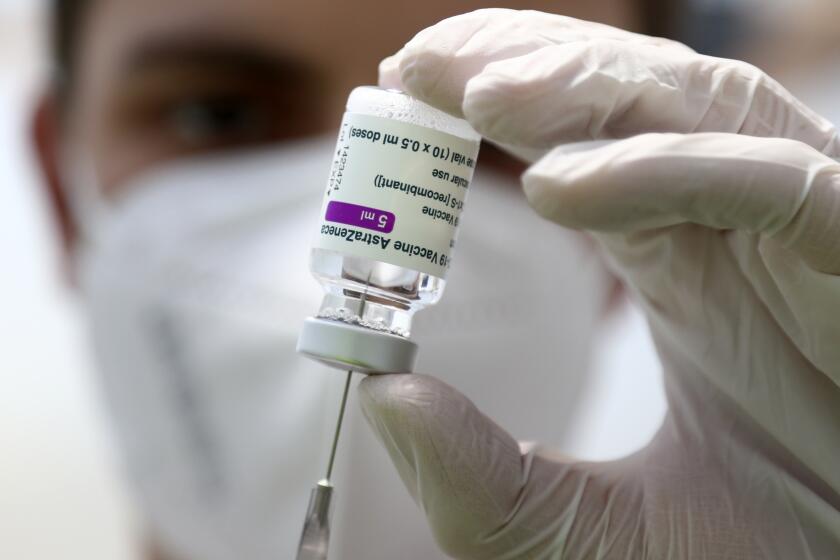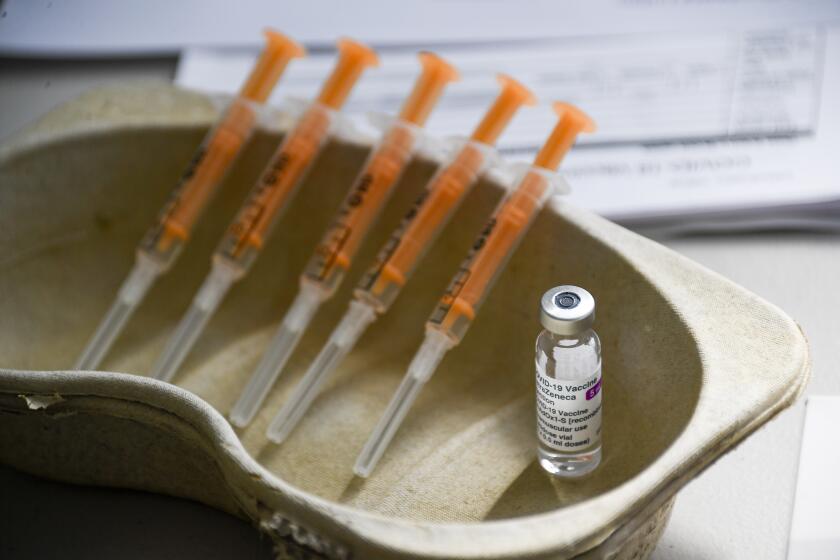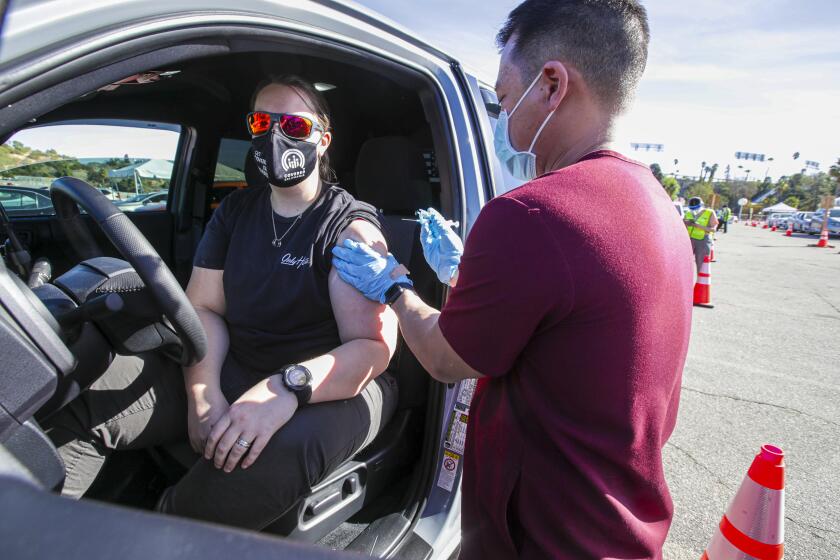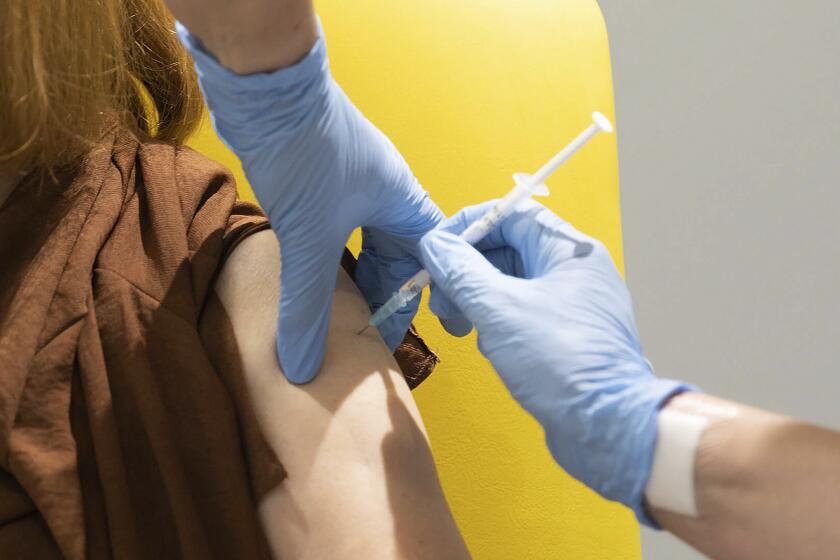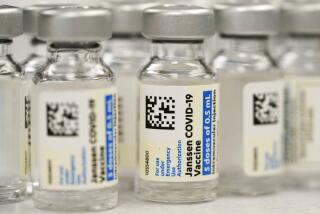Top EU drug official says link exists between AstraZeneca vaccine and blood clots
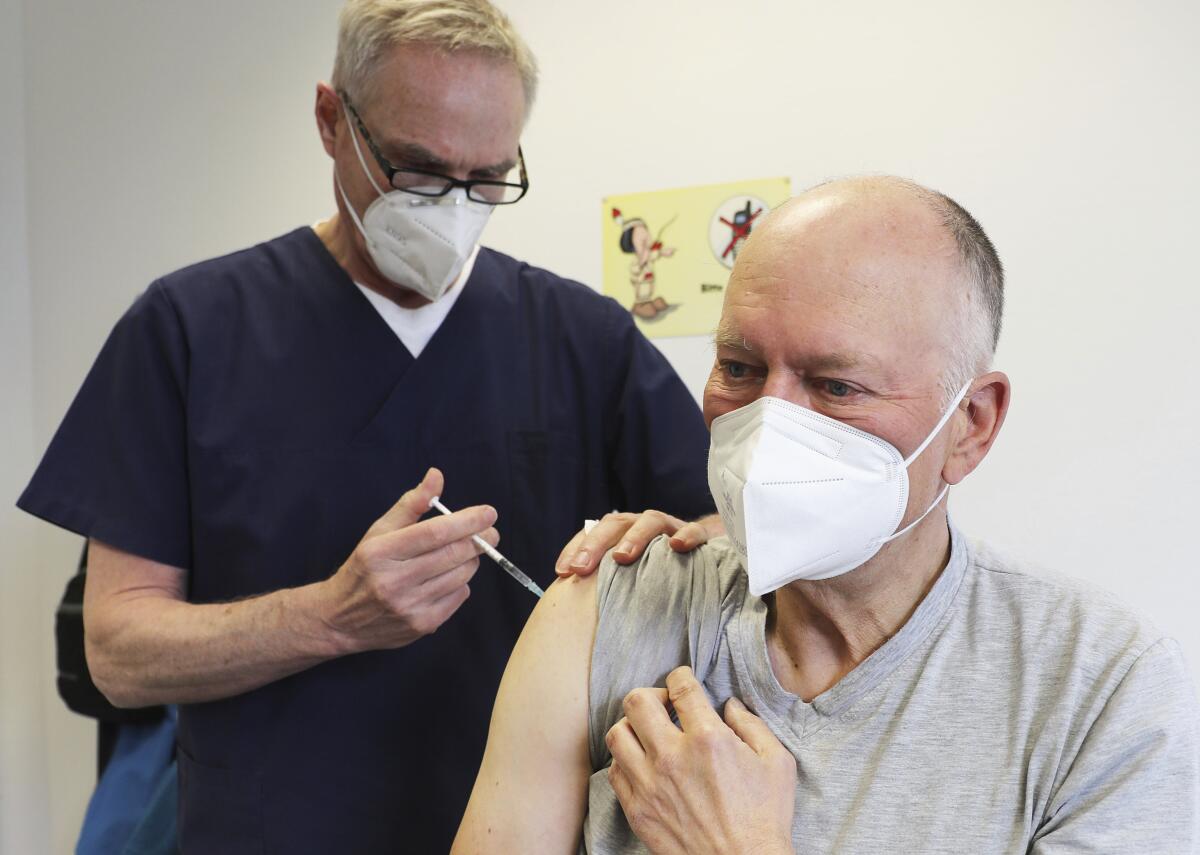
- Share via
ROME — A top official with Europe’s drugs regulator said in an interview published Tuesday that there is a link between AstraZeneca’s COVID-19 vaccine and rare blood clots found in a tiny fraction of recipients, but that it’s still unclear what the connection is and the benefits of taking the shot outweigh the risks of getting COVID-19.
Marco Cavaleri, head of health threats and vaccine strategy at the European Medicines Agency, told Rome’s Il Messaggero newspaper that the drugs regulator was preparing to declare a link later this week, although further study was still needed to understand why and how the phenomenon occurs.
Based on the evidence to date, Cavaleri said there’s a clear association between the AstraZeneca vaccine and the small number of rare blood clots that have been reported worldwide among the tens of millions of people who have received the shot.
“It is becoming more and more difficult to affirm that there isn’t a cause-and-effect relationship between AstraZeneca vaccines and the very rare cases of blood clots associated with a low level of [blood] platelets,” Cavaleri was quoted as saying. Many of the blood clots have been found in younger women.
Asked about Cavaleri’s comments, the EMA press office said the agency’s evaluation “has not yet reached a conclusion and the review is currently ongoing.” It said the agency planned a news conference as soon as the review is finalized, possibly Wednesday or Thursday.
AstraZeneca did not immediately respond to a request for comment.
German officials have decided to limit the use of AstraZeneca’s coronavirus vaccine in people younger than 60 after more unusual blood clots were reported.
Last month, more than a dozen countries, including Germany, suspended their use of AstraZeneca over the blood clot issue. Most restarted — some with age restrictions — after the EMA said the benefits of the vaccine outweighed the risks of not inoculating people against COVID-19. The Amsterdam-based agency said there was no evidence of an overall increased risk of blood clots, but it recommended that the vaccine’s leaflet be updated to inform doctors and patients about the rare clots.
Cavaleri said he appreciated the need for an unequivocal European recommendation on the safety of the vaccine for particular age groups, but said he didn’t expect the EMA to be able to provide that now.
“Certainly the information about the product will be updated, affirming that these adverse events are linked to the vaccine. It will be declared in a very clear way,” he was quoted as saying.
Any further doubts about the AstraZeneca vaccine would be a setback for the shot, which is critical to Europe’s immunization campaign and a linchpin in the global strategy to get vaccines to poorer countries. The AstraZeneca vaccine is cheaper and easier to use than rival vaccines from Pfizer and Moderna and has been approved for use in over 50 countries and groups, including by the 27-nation EU and the World Health Organization. U.S. authorities are still in the process of evaluating the vaccine.
AstraZeneca’s release of encouraging data on its COVID-19 vaccine from its U.S. trial raised hopes that the company could erase doubts about the shot.
Most European Union countries, including Italy, resumed using the AstraZeneca vaccine March 19, but some have limited it to recipients over 50 or even older cohorts.
Cavaleri said the rare blood clots, including some in the brain, coupled with a low level of blood platelets that may make people at risk of serious bleeding, “seem to be the key event to study further.”
Cavaleri said the biological mechanism for how the vaccine might be causing the rare clots was still unknown. If it is linked to how the shot is made, other vaccines with similar technologies might also need to be evaluated.
Cavaleri stressed that the risk-benefit analysis remained positive for the AstraZeneca vaccine, even for young women, who appear to be more affected by the clots.
President Biden announces he’s moving up the deadline for states to make all adults eligible for COVID-19 vaccines to April 19.
“Let’s not forget that young women also end up in intensive care with COVID. So we need to do very meticulous work to understand if the risk-benefit analysis remains for all ages,” Cavaleri told Il Messaggero.
He said the EMA was in a difficult situation, given the different levels of coronavirus outbreak in each of the EU’s 27 nations.
“Certainly, many people would like EMA to resolve the question for everyone, but it’s not that easy,” he said. “Let’s not forget that the weight of COVID is different in various countries. In Italy there are still around 500 people dying a day, in Norway nearly no one. These factors justify a different approach.”
He ruled out a preventive therapy to address the rare blood clots, saying there was still too much unknown about the phenomenon.
Even after the March 19 restart, the Dutch and German governments suspended the shots for people under 60, and some European residents have been shying away from the shot.
The president of Romania’s national vaccination committee, Valeriu Gheorghita, said Tuesday that since March, 207,000 people in Romania had canceled their AstraZeneca vaccine appointments, and another 92,000 simply didn’t show up.
“It is a high percentage — a third of people scheduled who did not show up,” Gheorghita told reporters.
British Prime Minister Boris Johnson declined to be drawn directly into the latest warnings about the vaccine, which was developed at Oxford University, but urged people to look at the advice from Britain’s independent Medicines and Healthcare Products Regulatory Agency.
The U.K. has approved a second COVID-19 vaccine. AstraZeneca says it aims to supply millions of doses in the first quarter.
“Their advice to people is to keep going out there, get your jab, get your second jab,” he said during a visit Tuesday to an AstraZeneca facility in Macclesfield, in northwest England.
Last week, the MHRA said seven people had died in Britain from blood clots after getting the AstraZeneca shot. It said it wasn’t clear if the shots were causing the clots and that it was undertaking a “rigorous review.” The agency said it had identified 30 blood clot cases out of 18.1 million AstraZeneca doses given by March 24.
Johnson said the rapid rollout of vaccines had helped turn around the coronavirus crisis in Britain this year and allowed it to roll back lockdown restrictions just as many other countries in Europe are putting them back up amid another coronavirus surge.
More to Read
Sign up for Essential California
The most important California stories and recommendations in your inbox every morning.
You may occasionally receive promotional content from the Los Angeles Times.
